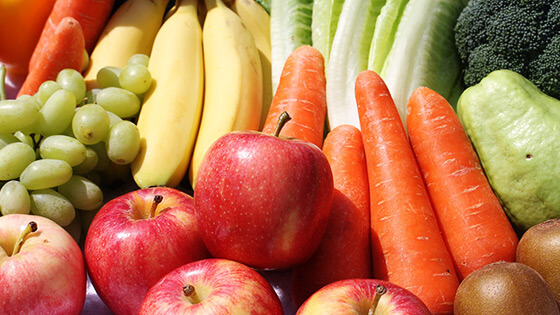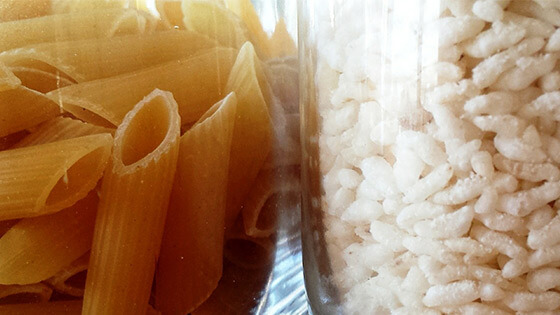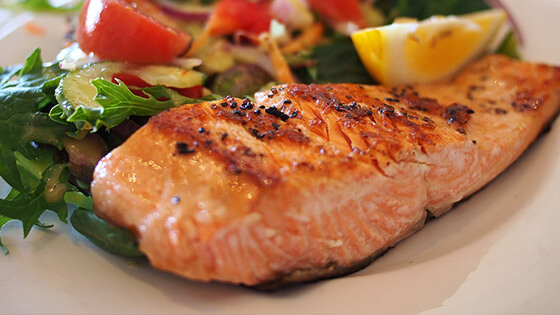Having a healthy diet in pregnancy
As you learned on the previous page, having a healthy diet during pregnancy is very important for the mother and for the baby. A healthy diet will provide all of the nutrients the mother needs to support her body during pregnancy, and it will also help the baby to grow and develop healthily.
Generally, a pregnant woman can simply follow the healthy eating guidance that is set out by the government in the Eatwell Guide – this will help the mother to make sure she eats a varied and balanced diet, and get all of the nutrients needed for a healthy pregnancy.
However, there are also certain foods that should be avoided during pregnancy, as they pose a risk to either the mother’s health or that of the baby.
Click on the images below to learn more about what should be included in a healthy pregnancy diet.
Fruit and vegetables
Eat at least five portions of fruit and vegetables every day. This can be fresh, frozen, tinned, dried or juiced.
Fruit and vegetables contain lots of vitamins and minerals, as well as a chemical called antioxidant. Vitamins and antioxidants help to keep us healthy – they can even help to prevent some types of cancers and other serious illnesses. These foods are also low in fat and high in fibre.
Carbohydrates
Starchy carbohydrates should make up just over a third of the food you eat. Examples of starchy carbohydrates include potatoes, bread, rice, pasta, noodles and breakfast cereals. Where possible, choose healthier options such as whole wheat pasta, wholegrain bread and brown rice for extra fibre.
Starchy foods are a good source of energy and fibre; they also contain a lot less calories than fats.
Proteins
Sources of protein – such as beans, pulses, fish, eggs, meat, poultry and nuts – should be eaten every day. Proteins in our diet help our body to stay healthy and to repair itself when needed. They also contain lots of vitamins and minerals.
Note that, while liver is a source of protein, this is one of the foods that should be avoided during pregnancy. We will take a look at this topic in more detail shortly.
Make sure that eggs have the red British Lion Code of Practice logo stamped on them – this shows that they have come from hens that have been vaccinated against salmonella, which makes them safe to eat in pregnancy.
Try to include two portions of fish every week (one portion should be an oily fish, such as salmon or mackerel). There are also certain types of fish that should be avoided during pregnancy, such as shark and swordfish.
When eating meat, aim for lean (less fatty) options or make sure all fat is trimmed off meat before you cook it. Also make sure that poultry, burgers, sausages and joints of meat are cooked all the way through (with no pink meat or juices).
Dairy and alternatives
Dairy foods such as milk, cheese, fromage frais and yoghurt are important in pregnancy, because they contain calcium and other nutrients needed by the mother and the baby. For example, calcium is essential for the development of strong bones.
It’s important to remember that dairy products can contain a lot of fat, so aim for lower-fat products where possible – such as semi-skimmed or skimmed milk, low-fat yoghurts and reduced-fat cheese.
There are some cheeses that should be avoided during pregnancy, and we’ll take a look at this topic in more detail shortly.
Foods high in fat and sugar
It is important to limit the amount of these foods in the diet, as they don’t offer any beneficial nutrients. These foods include crisps, cakes, chocolate, biscuits, pastries, sweets, ice cream and fizzy drinks.
Fatty/sugary foods are often very high in calories, which can contribute to weight gain.
Eating too much fat can also increase the body’s cholesterol levels, which can lead to an increased risk of heart disease.
Did you know?
Some women find that pregnancy changes how they feel about certain foods or drinks. For example, they may experience cravings for new or different (or even strange) foods, they may find that food tastes different to them when they are pregnant or they simply lose interest in eating or drinking things that they used to enjoy.





